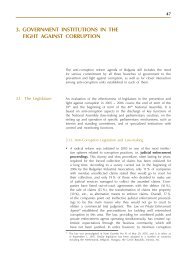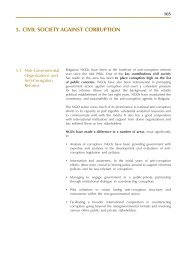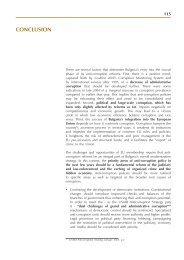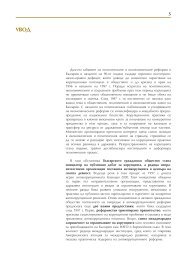National Threat Assessment 2008. Organised Crime - Politie
National Threat Assessment 2008. Organised Crime - Politie
National Threat Assessment 2008. Organised Crime - Politie
Create successful ePaper yourself
Turn your PDF publications into a flip-book with our unique Google optimized e-Paper software.
Concealment<br />
The Internet offers possibilities to conceal communication, such as Voice over IP<br />
(VoIP) and chat programs. VoIP is a way of making phone calls via the Internet.<br />
Tapping VoIP calls is difficult. Criminal organisations therefore deliberately<br />
choose to make VoIP calls. Skype is used in the cannabis sector and human<br />
traffickers use chatrooms to communicate with each other.<br />
Wireless networks can sometimes be used for anonymity and therefore<br />
concealment on the Internet. Using the Internet via a wireless network (WiFi)<br />
has become more and more common in recent years. In addition, wireless<br />
Internet connections can also be made in a growing number of public places<br />
nowadays. The inadequate and limited security of wireless networks and<br />
computers offers criminals the opportunity to hack into a computer remotely.<br />
They can then access the Internet using a different identity (IP address).<br />
Exchange of knowledge and expertise<br />
The Internet is a source of information for everyone - including people with<br />
criminal intentions. For example, recipes for explosives can be found relatively<br />
easily. These recipes include nitroglycerine, a highly explosive component of<br />
dynamite and other explosives. The Internet also provides instructions on how<br />
to make land mines, Molotov cocktails, fire bombs and napalm, all of which<br />
are easy to find. The fact that homemade explosives can be effective was<br />
demonstrated by the attacks on the London Underground and the Madrid<br />
Metro. The chemicals for these explosives are legally available because they<br />
are also used for industrial and agricultural purposes.<br />
Information about advanced security systems is also shared via the Internet<br />
among car thieves who target new and expensive cars that are equipped with<br />
innovative security systems. However, each new technical security masterpiece<br />
loses its value fairly quickly because people always seem to find a ‘remedy’ for<br />
security systems. Manuals on how to sabotage the security system in question<br />
can be found on the Internet in no time.<br />
Young hackers find the information required to perfect their skills on the<br />
Internet. Ready-made hacking programs can be downloaded easily. Criminal<br />
organisations contact hackers via chatrooms and online forums. The hackers<br />
are then used to manage botnets, which may have been obtained via Internet<br />
offers. They are also hired to retrieve identity data via the Internet. When<br />
criminal organisations hire digital expertise it does not matter how far away<br />
the person is located. Hackers can be hired who are based anywhere in the<br />
world. Due to the fact that the contacts are entirely virtual, anonymity is<br />
guaranteed much better than in the case of traditional criminal collaboration.<br />
Information provision, knowledge exchange, marketing and communication<br />
have flourished thanks to the Internet. Coffee shops and grow shops advertise<br />
chapter 6 – alerts<br />
227








